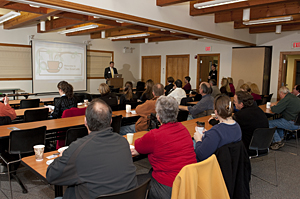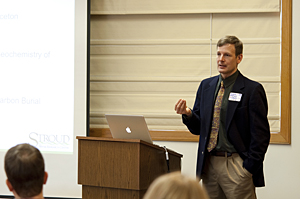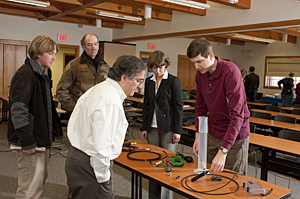


ADVERTISEMENT
- Rozovsky wins prestigious NSF Early Career Award
- UD students meet alumni, experience 'closing bell' at NYSE
- Newark Police seek assistance in identifying suspects in robbery
- Rivlin says bipartisan budget action, stronger budget rules key to reversing debt
- Stink bugs shouldn't pose problem until late summer
- Gao to honor Placido Domingo in Washington performance
- Adopt-A-Highway project keeps Lewes road clean
- WVUD's Radiothon fundraiser runs April 1-10
- W.D. Snodgrass Symposium to honor Pulitzer winner
- New guide helps cancer patients manage symptoms
- UD in the News, March 25, 2011
- For the Record, March 25, 2011
- Public opinion expert discusses world views of U.S. in Global Agenda series
- Congressional delegation, dean laud Center for Community Research and Service program
- Center for Political Communication sets symposium on politics, entertainment
- Students work to raise funds, awareness of domestic violence
- Equestrian team wins regional championship in Western riding
- Markell, Harker stress importance of agriculture to Delaware's economy
- Carol A. Ammon MBA Case Competition winners announced
- Prof presents blood-clotting studies at Gordon Research Conference
- Sexual Assault Awareness Month events, programs announced
- Stay connected with Sea Grant, CEOE e-newsletter
- A message to UD regarding the tragedy in Japan
- More News >>
- March 31-May 14: REP stages Neil Simon's 'The Good Doctor'
- April 2: Newark plans annual 'wine and dine'
- April 5: Expert perspective on U.S. health care
- April 5: Comedian Ace Guillen to visit Scrounge
- April 6, May 4: School of Nursing sponsors research lecture series
- April 6-May 4: Confucius Institute presents Chinese Film Series on Wednesdays
- April 6: IPCC's Pachauri to discuss sustainable development in DENIN Dialogue Series
- April 7: 'WVUDstock' radiothon concert announced
- April 8: English Language Institute presents 'Arts in Translation'
- April 9: Green and Healthy Living Expo planned at The Bob
- April 9: Center for Political Communication to host Onion editor
- April 10: Alumni Easter Egg-stravaganza planned
- April 11: CDS session to focus on visual assistive technologies
- April 12: T.J. Stiles to speak at UDLA annual dinner
- April 15, 16: Annual UD push lawnmower tune-up scheduled
- April 15, 16: Master Players series presents iMusic 4, China Magpie
- April 15, 16: Delaware Symphony, UD chorus to perform Mahler work
- April 18: Former NFL Coach Bill Cowher featured in UD Speaks
- April 21-24: Sesame Street Live brings Elmo and friends to The Bob
- April 30: Save the date for Ag Day 2011 at UD
- April 30: Symposium to consider 'Frontiers at the Chemistry-Biology Interface'
- April 30-May 1: Relay for Life set at Delaware Field House
- May 4: Delaware Membrane Protein Symposium announced
- May 5: Northwestern University's Leon Keer to deliver Kerr lecture
- May 7: Women's volleyball team to host second annual Spring Fling
- Through May 3: SPPA announces speakers for 10th annual lecture series
- Through May 4: Global Agenda sees U.S. through others' eyes; World Bank president to speak
- Through May 4: 'Research on Race, Ethnicity, Culture' topic of series
- Through May 9: Black American Studies announces lecture series
- Through May 11: 'Challenges in Jewish Culture' lecture series announced
- Through May 11: Area Studies research featured in speaker series
- Through June 5: 'Andy Warhol: Behind the Camera' on view in Old College Gallery
- Through July 15: 'Bodyscapes' on view at Mechanical Hall Gallery
- More What's Happening >>
- UD calendar >>
- Middle States evaluation team on campus April 5
- Phipps named HR Liaison of the Quarter
- Senior wins iPad for participating in assessment study
- April 19: Procurement Services schedules information sessions
- UD Bookstore announces spring break hours
- HealthyU Wellness Program encourages employees to 'Step into Spring'
- April 8-29: Faculty roundtable series considers student engagement
- GRE is changing; learn more at April 15 info session
- April 30: UD Evening with Blue Rocks set for employees
- Morris Library to be open 24/7 during final exams
- More Campus FYI >>
3:50 p.m., March 15, 2011----The University of Delaware and the Delaware Department of Natural Resources and Environmental Control (DNREC) have created a new avenue to connect science with resource management by launching a series of workshops where environmental academicians and regulators can share current research and discuss research needs.
Through the sponsorship of the Delaware Environmental Institute (DENIN), the informal workshops bring personnel from both groups together for presentations, conversation and exploration of possible collaboration. Known as the EcoCafé, the workshops offer a time and place for faculty in environmental sciences, engineering and policy to sit down with like-minded colleagues at DNREC and share experiences, needs and issues over coffee.
“We know there is a lot of common ground between us,” said Don Sparks, S. Hallock du Pont Chair of Soil and Environmental Chemistry at UD and director of DENIN. “We just needed a place to gather and find out what the other is doing and what each other's needs are. Environmental expertise is spread very widely across the University, but DENIN has the mission and the capability to bring people together and provide an entry point for people outside the University who share environmental concerns.”
Sparks said that he anticipates hosting an EcoCafé every three or four months.
“Resource managers must depend upon the most up-to-date science, both natural and social, in order to have any basis for making decisions,” DNREC Secretary Collin O'Mara stated. “This partnership between the University and DNREC creates a positive linkage of environmental entities that can only benefit from collaborative learning. We are very appreciative that DENIN is facilitating these opportunities to share expertise in a conversational setting that builds on a long-standing relationship of cooperation.”
The first EcoCafé on March 8 at the St. Jones Reserve near Dover featured an introduction to DENIN by Sparks and a discussion of ongoing research being conducted in the Christina River Basin by a team of scientists from UD and the Stroud Water Research Center in Avondale, Pa. The research is part of a larger network of long-term environmental monitoring projects, known as Critical Zone Observatories (CZOs), sponsored by the National Science Foundation.
Anthony Aufdenkampe, assistant research scientist at Stroud, presented the goals and objectives of the Christina River Basin CZO and the progress made to date in establishing a large network of environmental monitoring stations throughout the river basin. He said that such extensive monitoring has been made possible only recently through the development of open-source electronic hardware for assembling customized sensors at a fraction of the cost of more traditional sensors. Several of the research sensors were on display for examination by EcoCafé attendees.
“As you all know, the Christina River Basin is important because it provides 60 percent of the drinking water for the citizens of Delaware and probably another half a million people in southeastern Pennsylvania,” Aufdenkampe told the audience of about 20 DNREC staff. He pointed out that water quality data collected on streams such as the Brandywine, White Clay and Red Clay Creeks as part of the CZO project would be available to policy makers via publicly accessible websites.
Founded in October 2009, the Delaware Environmental Institute conducts research and coordinates partnerships that integrate environmental science, engineering and policy in order to provide solutions and strategies that address environmental challenges. The institute is supported through NSF's Experimental Program to Stimulate Competitive Research (EPSCoR), which includes both federal and state funds.
Article by Beth Chajes
Photos by Kathy Atkinson


